广州版小学英语五年级下册Module1 Unit3之一 PPT课件
文档属性
| 名称 | 广州版小学英语五年级下册Module1 Unit3之一 PPT课件 | 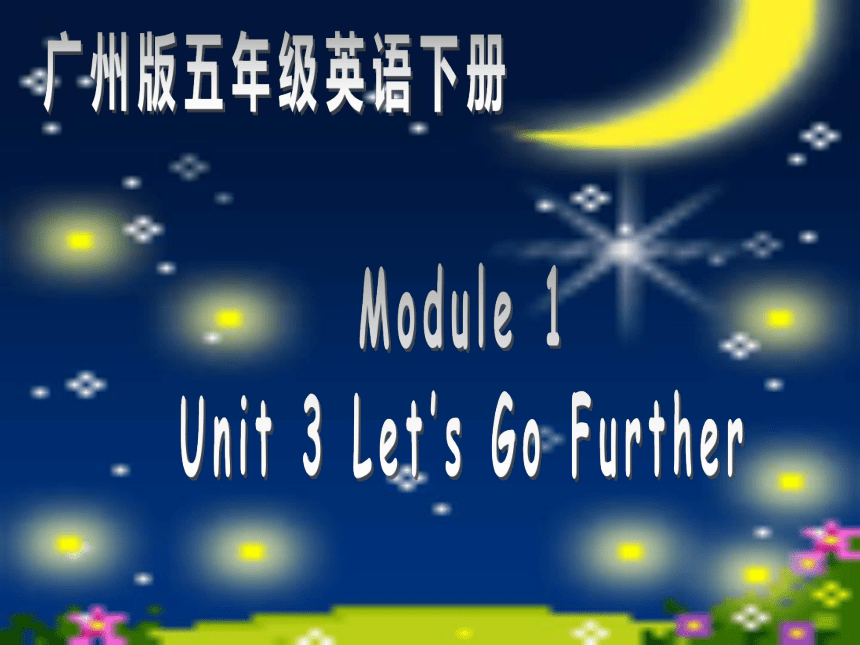 | |
| 格式 | zip | ||
| 文件大小 | 2.2MB | ||
| 资源类型 | 教案 | ||
| 版本资源 | 广州版 | ||
| 科目 | 英语 | ||
| 更新时间 | 2012-04-10 19:58:29 | ||
图片预览

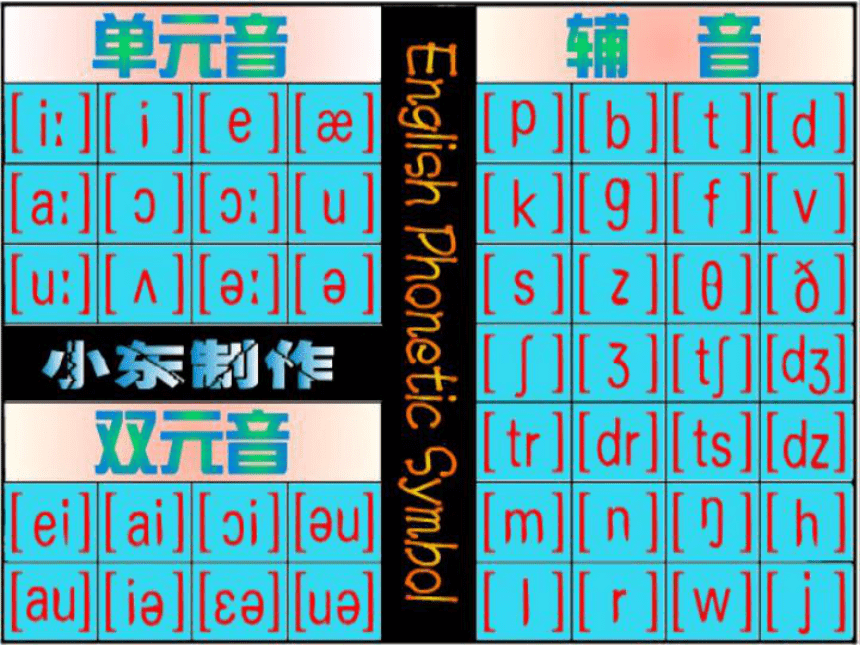
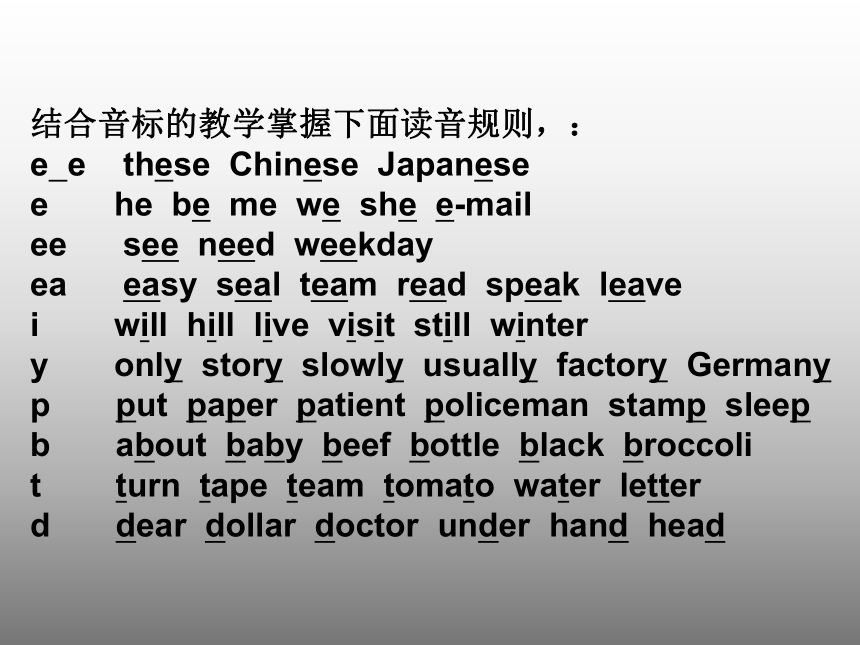
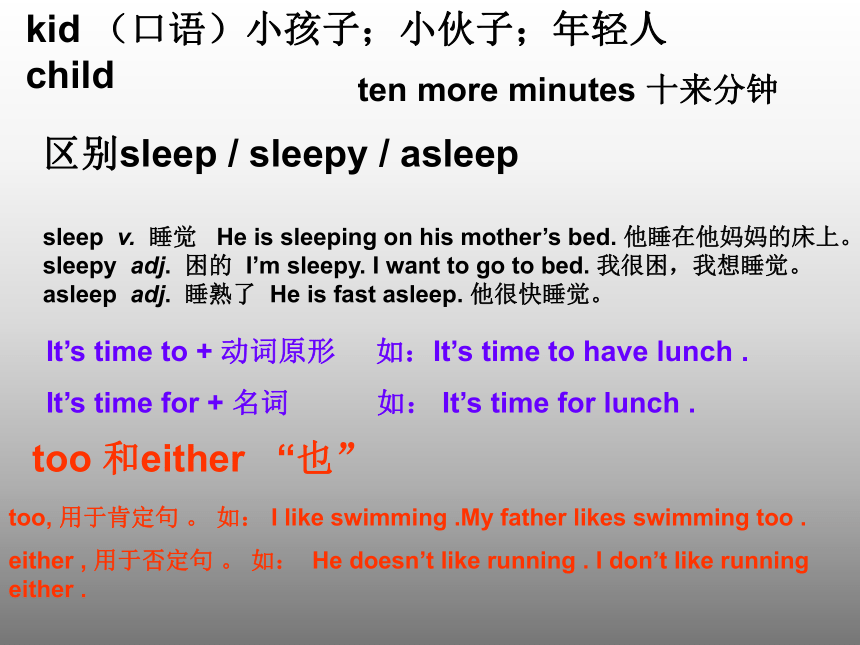
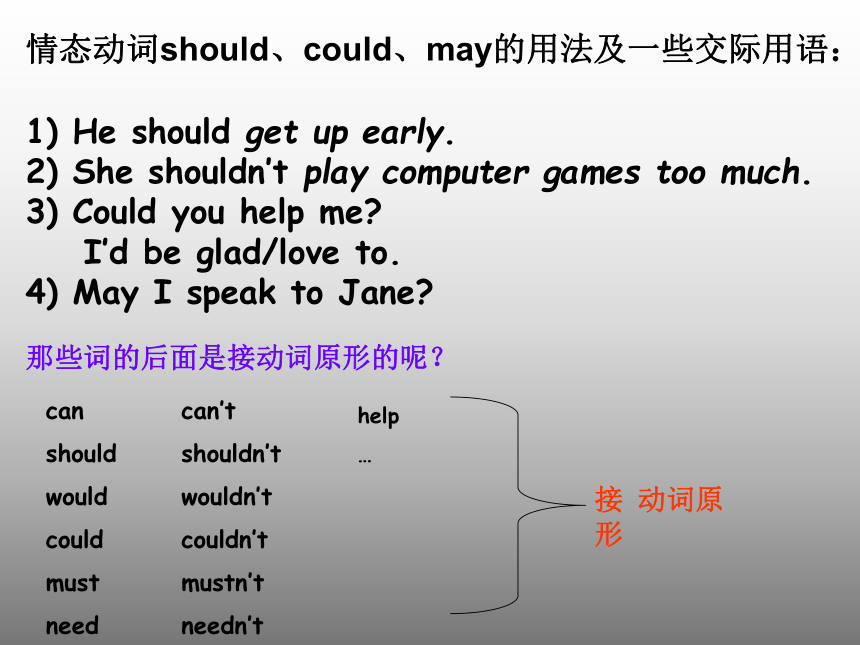
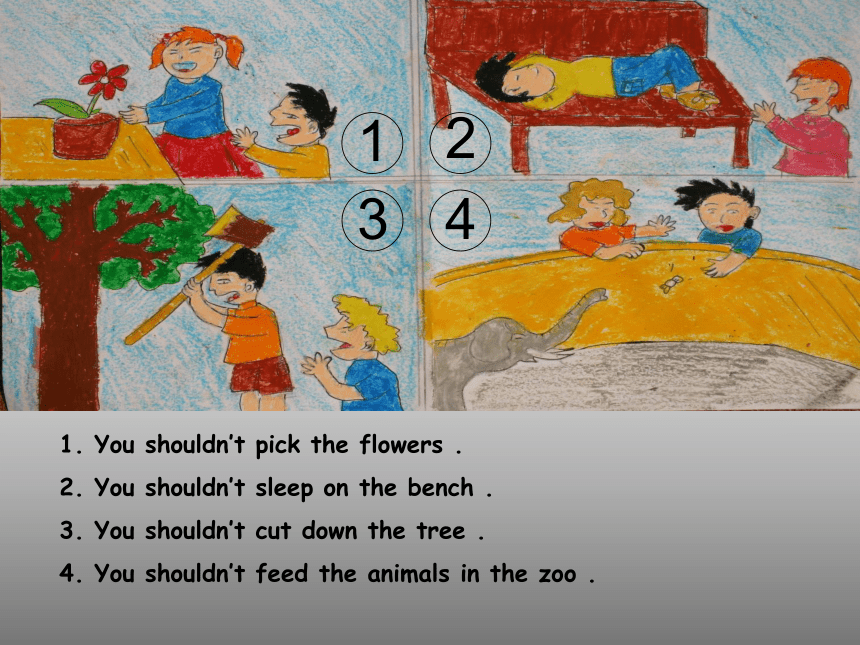
文档简介
(共12张PPT)
结合音标的教学掌握下面读音规则,:
e e these Chinese Japanese
e he be me we she e-mail
ee see need weekday
ea easy seal team read speak leave
i will hill live visit still winter
y only story slowly usually factory Germany
p put paper patient policeman stamp sleep
b about baby beef bottle black broccoli
t turn tape team tomato water letter
d dear dollar doctor under hand head
区别sleep / sleepy / asleep
sleep v. 睡觉 He is sleeping on his mother’s bed. 他睡在他妈妈的床上。
sleepy adj. 困的 I’m sleepy. I want to go to bed. 我很困,我想睡觉。
asleep adj. 睡熟了 He is fast asleep. 他很快睡觉。
kid (口语)小孩子;小伙子;年轻人
child
It’s time to + 动词原形 如:It’s time to have lunch .
It’s time for + 名词 如: It’s time for lunch .
ten more minutes 十来分钟
too, 用于肯定句 。 如: I like swimming .My father likes swimming too .
either , 用于否定句 。 如: He doesn’t like running . I don’t like running either .
too 和either “也”
情态动词should、could、may的用法及一些交际用语:
1) He should get up early.
2) She shouldn’t play computer games too much.
3) Could you help me
I’d be glad/love to.
4) May I speak to Jane
那些词的后面是接动词原形的呢?
can
should
would
could
must
need
can’t
shouldn’t
wouldn’t
couldn’t
mustn’t
needn’t
help
…
接 动词原形
1
2
3
4
1. You shouldn’t pick the flowers .
2. You shouldn’t sleep on the bench .
3. You shouldn’t cut down the tree .
4. You shouldn’t feed the animals in the zoo .
What time do you get up,…
What time do you go to school ,…
What time do you have class ,…
I get up at a quarter past seven.
I go to school at eight o’clock.
I have class at half past eight .
Report :
_______ gets up at 7:15 .
She goes to school 8:00 .
She has class 8:30 .
…
Did You Know:
Don’t be late for party.
参加聚会不要迟到。
2. Don’t ask adults about ages.
不要问成年人关于他们的年龄。
3. Don’t talk to others when
there’s too much food in your mouth.
在满嘴是食物是不要跟别人说话。
May/Can/Could I speak to……? This is …speaking.
Who’s calling
It’s……here.
Is that……? No answer.
Wrong number. /I’m sorry I have the wrong number.
Sorry, I didn’t understand. 抱歉, 我听不懂. Pardon
I’ll call her again. 我会再打给她.
I’ll call back later. 我稍后会再打来.
See you later.
Can I leave a message 我可以留言吗?
Could you ask him to call me back 可以请他给我回电话吗 Please ask him to call me back .
电话用语
在should , can , could , would , may , 等情态动词的后面应该接动词原形。
如果句子中出现频度副词 usually , sometimes, often , always , never, seldom 时,或者出现every day/… 句子应该用一般时态(用动词原形或者动词的第三人称单数)
如果句中含有表示将来的时间的词tomorrow , next ,要用一般将来时 be(am , is , are ) going to.
4. 如果出现look , listen , now 的时候,请用正在进行时态 be (am , is , are ) doing .
动词加s的读法:
a. 在清辅音后读/s/;在浊辅音后读/z/; b. ts 读 /ts/; ds 读 /dz/; c. es 常读 /iz/ 如brushes; d. 以辅音字母加y动词,改y为i加es后,es读/z/; e. 部分以o结尾的动词: goes; does读/z/;
当主语是第三人称单数时, 一般现在时的动词的变化的规律: 1) 一般情况加-s,例如: visit – visits tell – tells work – works wave – waves 2) 以s, x, sh, ch结尾的动词, 加-es,例如: wash – washes watch – watches catch – catches 3) 以辅音字母加y结尾的动词,改y为i加-es,例如: fly – flies study – studies
4)、部分以o结尾的动词加-es,例如: go – goes do – does 5)、特殊情况 have – has
结合音标的教学掌握下面读音规则,:
e e these Chinese Japanese
e he be me we she e-mail
ee see need weekday
ea easy seal team read speak leave
i will hill live visit still winter
y only story slowly usually factory Germany
p put paper patient policeman stamp sleep
b about baby beef bottle black broccoli
t turn tape team tomato water letter
d dear dollar doctor under hand head
区别sleep / sleepy / asleep
sleep v. 睡觉 He is sleeping on his mother’s bed. 他睡在他妈妈的床上。
sleepy adj. 困的 I’m sleepy. I want to go to bed. 我很困,我想睡觉。
asleep adj. 睡熟了 He is fast asleep. 他很快睡觉。
kid (口语)小孩子;小伙子;年轻人
child
It’s time to + 动词原形 如:It’s time to have lunch .
It’s time for + 名词 如: It’s time for lunch .
ten more minutes 十来分钟
too, 用于肯定句 。 如: I like swimming .My father likes swimming too .
either , 用于否定句 。 如: He doesn’t like running . I don’t like running either .
too 和either “也”
情态动词should、could、may的用法及一些交际用语:
1) He should get up early.
2) She shouldn’t play computer games too much.
3) Could you help me
I’d be glad/love to.
4) May I speak to Jane
那些词的后面是接动词原形的呢?
can
should
would
could
must
need
can’t
shouldn’t
wouldn’t
couldn’t
mustn’t
needn’t
help
…
接 动词原形
1
2
3
4
1. You shouldn’t pick the flowers .
2. You shouldn’t sleep on the bench .
3. You shouldn’t cut down the tree .
4. You shouldn’t feed the animals in the zoo .
What time do you get up,…
What time do you go to school ,…
What time do you have class ,…
I get up at a quarter past seven.
I go to school at eight o’clock.
I have class at half past eight .
Report :
_______ gets up at 7:15 .
She goes to school 8:00 .
She has class 8:30 .
…
Did You Know:
Don’t be late for party.
参加聚会不要迟到。
2. Don’t ask adults about ages.
不要问成年人关于他们的年龄。
3. Don’t talk to others when
there’s too much food in your mouth.
在满嘴是食物是不要跟别人说话。
May/Can/Could I speak to……? This is …speaking.
Who’s calling
It’s……here.
Is that……? No answer.
Wrong number. /I’m sorry I have the wrong number.
Sorry, I didn’t understand. 抱歉, 我听不懂. Pardon
I’ll call her again. 我会再打给她.
I’ll call back later. 我稍后会再打来.
See you later.
Can I leave a message 我可以留言吗?
Could you ask him to call me back 可以请他给我回电话吗 Please ask him to call me back .
电话用语
在should , can , could , would , may , 等情态动词的后面应该接动词原形。
如果句子中出现频度副词 usually , sometimes, often , always , never, seldom 时,或者出现every day/… 句子应该用一般时态(用动词原形或者动词的第三人称单数)
如果句中含有表示将来的时间的词tomorrow , next ,要用一般将来时 be(am , is , are ) going to.
4. 如果出现look , listen , now 的时候,请用正在进行时态 be (am , is , are ) doing .
动词加s的读法:
a. 在清辅音后读/s/;在浊辅音后读/z/; b. ts 读 /ts/; ds 读 /dz/; c. es 常读 /iz/ 如brushes; d. 以辅音字母加y动词,改y为i加es后,es读/z/; e. 部分以o结尾的动词: goes; does读/z/;
当主语是第三人称单数时, 一般现在时的动词的变化的规律: 1) 一般情况加-s,例如: visit – visits tell – tells work – works wave – waves 2) 以s, x, sh, ch结尾的动词, 加-es,例如: wash – washes watch – watches catch – catches 3) 以辅音字母加y结尾的动词,改y为i加-es,例如: fly – flies study – studies
4)、部分以o结尾的动词加-es,例如: go – goes do – does 5)、特殊情况 have – has
同课章节目录
- Module 1 Seasons
- Unit 1 What's your favourite season?
- Unit 2 It's the middle of winte
- Module 2 Plans
- Unit 3 We are going to have an English test
- Unit 4 Have a good time in Hainan
- Module 3 Invitations
- Unit 5 Would you like to go with us?
- Unit 6 See you at the party
- Module 4 Travel
- Unit 7 We will go by train
- Unit 8 Ben's first trip to Beijing
- Module 5 Safety
- Unit 9 Be careful!
- Unit 10 How to stay safe
- Module 6 Directions
- Unit 11 Can you tell me the way?
- Unit 12 I know a short cut
- Module 7 Let's look back
